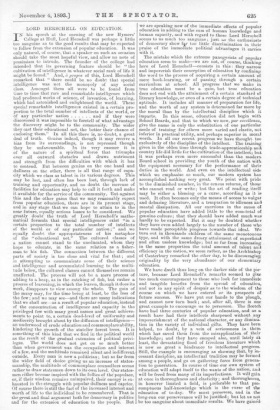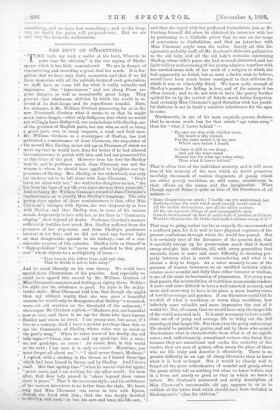LORD HERSCHELL ON EDUCATION.
INhis speech at the opening of the new Hymers' College at Hull, Lord Herschel] was perhaps a little too sanguine as to the good results that may be expected to follow from the extension of popular education. It was only natural, of course, that a speaker on such an occasion should take the most hopeful view, and allow no note of pessimism to intrude. The founder of the college had intended that its governing feature should be " the cultivation of intelligence in whatever social rank of life it might be found." And, apropos of this, Lord Herschell remarked that " there could be no doubt that special intelligence was not the monopoly of any social class. Amongst them all were to be found from time to time that rare and remarkable intelligence which had produced works of science, of invention, of learning, which had astonished and enlightened the world. These special remarkable intelligences existed in a certain pro- portion to the total number of intellects of the world, or of any particular nation and if they were discovered it was impossible to foretell of what. advantage the discovery might be to the community. The wider they cast their educational net, the better their chance of enclosing them." In all this there is, no doubt, a great deal of truth. Genius indeed, though it may receive a bias from its surroundings, is not repressed though they be unfavourable. In its very essence it is of the nature of a spiritual force that triumphs over all outward obstacles and draws nutriment and strength from the difficulties with which it has to contend. But between genius on the one hand and dullness on the other, there is all that range of capa- city which we class as talent in its various degrees. This may be lost, and often has been lost, through lack of training and opportunity, and no doubt the increase of facilities for education may help to call it forth and make it available for the service of the community. But against this and the other gains that we may reasonably expect from popular education, there are in its present stage, and in any stage that we can hope to attain to in the near future, equally serious losses to be considered. We greatly doubt the truth of Lord Herschell's mathe- matical formula that special intelligences exist "in a certain proportion to the total number of intellects of the world or of any particular nation ; " and we equally doubt the appropriateness of his metaphor of the "educational net." The cultured classes of a nation cannot stand to the uneducated, whom they hope to educate, in the same relation as a fisher- man to his fish. The connection between the different parts of society is too close and vital for that ; and in attempting to communicate some of their science and intelligence and accumulated learning to the multi- tude below, the cultured classes cannot themselves remain unaffected. The process will not be a mere process of adding to a heap, as in the catching of fish, but rather a process of leavening, in which the leaven, though it does its work, disappears to view among the whole. The gain of the many may, for the time being at least, be the loss of the few ; and we may see—and there are many indications that we shall see—as a result of popular education, instead of the concentration of intelligence and capacity in the privileged few with many great names and great achieve- ments to point to, a certain dead-level of uniformity and mediocrity brought about by the diffusion of intelligence— an underwood of crude education and commonplace ability, hindering the growth of the statelier forest trees. It is something of this kind that we find in the political world as the result of the gradual extension of political privi- leges. The world does not get on so much better than when government was the occupation and interest of a few, and the multitude remained silent an d indifferent outside. Every man is now a politician; but so far from the wider field of choice giving us an increase of states- manship, the multitude of commonplace counsellors seems rather to draw statesmen down to its own level. Our states• men either become inspired with the follies of the populace, or, if their wisdom remains unimpaired, their energy is ex- hausted in the.struggle with popular dullness and caprice. Of course there is still the fact of the increased interest and worth of life to the individual to be remembered. That is the great and final argument both for democracy in politics and for the extension of education to the people. But we are speaking now of the immediate effects of popular education in adding to the sum of human knowledge and human capacity, and with regard to these Lord Herschell seems to us much too sanguine ; just as the enthusiasts of democracy show fair too little discrimination in their praise of the immediate political advantages it carries with it.
The mistake which the extreme panegyrists of popular education seem to make—we are not, of course, thinking here of Lord Herschell—consists in this : they narrow and impoverish their conception of education by confining the word to the process of acquiring a certain amount of mere book-learning, or of passing through a certain curriculum at school. All progress that we make in true education must be a gain, but true education does not end with the attainment of a certain standard of literary knowledge, or even of a certain degree of technical aptitude. It includes all manner of preparation for life, and the worth of any system is determined far more by the moral than by the intellectual discipline which it imparts. In this sense, education did not begin with School Boards, and that to which we now, par excellence, give the name is only the substitution of one particular mode of training for others more varied and elastic, not inferior in practical utility, and perhaps superior in moral worth. In all our recent progress we have thought too exclusively of the discipline of the intellect. The training given in the olden time through trade-apprenticeship and, country life did little for the cultivation of the intellect; but it was perhaps even more successful than the modern Board school in providing the youth of the nation with the equipment necessary for the performance of their duties in the world. And even on the intellectual side which we emphasise so much, our modern system has accomplished nothing very great. We point with pride to the diminished number, in the census returns, of those who cannot read or write ; but the art of reading ing itself may be either a blessing or a curse, according as it isr used. It often becomes only the means of access to vulgar and debasing literature, and a temptation to idleness and mental dissipation. All our exertions in the cause of popular education have added little to the sum-total of genuine culture ; that they should have added much was hardly to be expected. But it may be doubted whether they have even added largely to the number of those who have made perceptible progress towards that ideal. We turn out in thousands children of the same monotonous type, and with the same dreary attainment of superficia4 and often useless knowledge; but so far from increasing in the same proportion the total amount of talent and efficiency in the nation, we seem rather, as the Archbishop of Canterbury remarked the other day, to be discouraging originality by the very abundance of our elementary education.
We have dwelt thus long on the darker side of the pie. ture, because Lord Herschell's remarks seemed to give too much encouragement to those who look for immediate and tangible benefits from the spread of education,, and not in any spirit of despair as to the wisdom of the course on which we have entered or its prospects Of future success. We have put our hands to the plough, and cannot now turn back ; and, after all, there is one great example to encourage us to persevere. The Scotch have had three centuries of popular education, and as a result have had their intellects sharpened without any impoverishment of the national character, or any diminu- tion in the variety of individual gifts. They have been helped, no doubt, by a vein of seriousness in them which has saved them from the misapplication of their knowledge ; and they have escaped also, until lately at least, the devastating flood of frivolous literature which is now so great a hindrance to intellectual progress. Still, the example is encouraging as showing that, by in- cessant discipline, an intellectual tradition may be formed among a people, and go on gathering force from genera. tion to generation. In course of time our own system of education will adapt itself to the wants of the nation, and will be freed from many of its imperfections. It will gain at once in thoroughness and elasticity ; and thoroughness, in however limited a field, is preferable to that pre- sumptuous half-knowledge which is the curse of the education of to-day. We must persevere, and in the long-run our perseverance will be justified ; but let us not be too sanguine about immediate results. We have gained . something, and we have lost something ; and in the long- ( run no doubt the gains will preponderate. But we are I still very far from the millennium.





















































 Previous page
Previous page